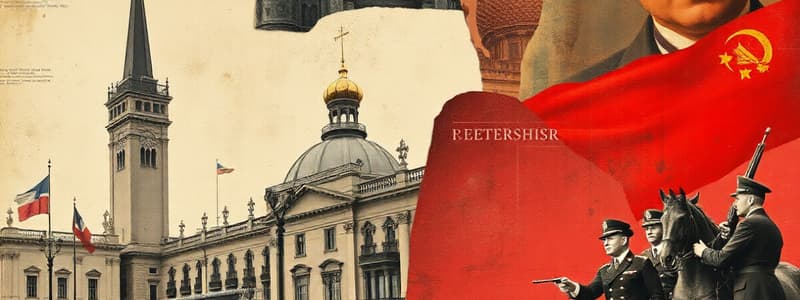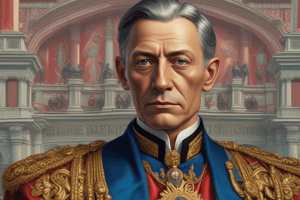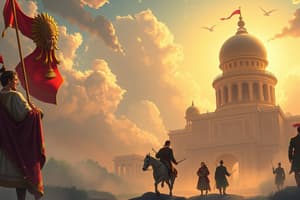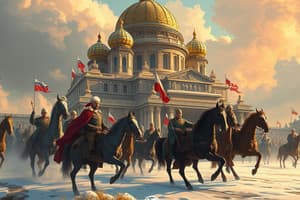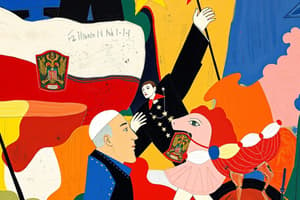Podcast
Questions and Answers
What was the primary source of the Provisional Government's limited authority following the Tsar's abdication?
What was the primary source of the Provisional Government's limited authority following the Tsar's abdication?
- Its reluctance to address the demands of the Petrograd Soviet, leading to widespread disapproval.
- Its focus on maintaining the monarchy, conflicting with the revolutionary sentiments of the Russian people.
- Its inability to gain support from the military, causing instability and undermining its decisions.
- Its basis as a self-proclaimed body rather than an elected one, resulting in a lack of legitimate claim to power. (correct)
What was the initial role of the Petrograd Soviet in relation to the Provisional Government after the February Revolution?
What was the initial role of the Petrograd Soviet in relation to the Provisional Government after the February Revolution?
- To function as the primary governing body, sidelining the Provisional Government completely.
- To serve as a consultative body focused on monitoring and ensuring the consideration of worker and soldier interests. (correct)
- To actively undermine the Provisional Government by organizing protests and strikes.
- To provide financial support to the Provisional Government in exchange for political influence.
How did the existence of the Petrograd Soviet impact the power and stability of the Provisional Government?
How did the existence of the Petrograd Soviet impact the power and stability of the Provisional Government?
- It strengthened the Provisional Government by consolidating support from the working class.
- It had no significant impact, as the Soviet was primarily focused on social issues.
- It weakened the Provisional Government by directly funding counter-revolutionary movements.
- It created a situation of dual authority, challenging the Provisional Government's decisions. (correct)
What was a significant consequence of the Provisional Government not being an elected body?
What was a significant consequence of the Provisional Government not being an elected body?
How did the rapid establishment of soviets across Russia influence the political landscape after the February Revolution?
How did the rapid establishment of soviets across Russia influence the political landscape after the February Revolution?
What factor most negatively affected the Russian Provisional Government in the period after the Tsar's abdication?
What factor most negatively affected the Russian Provisional Government in the period after the Tsar's abdication?
Alexander Kerensky held positions in both the Provisional Government and the Petrograd Soviet. What does this suggest about the relationship between these two entities in the early months after the February Revolution?
Alexander Kerensky held positions in both the Provisional Government and the Petrograd Soviet. What does this suggest about the relationship between these two entities in the early months after the February Revolution?
Paul Milyukov, upon announcing the new government, stated they were appointed by 'the revolution itself.' What is the most accurate interpretation of this statement in terms of the Provisional Government's authority?
Paul Milyukov, upon announcing the new government, stated they were appointed by 'the revolution itself.' What is the most accurate interpretation of this statement in terms of the Provisional Government's authority?
What political strategy, later rejected by Lenin, did Kamenev and Stalin initially support upon the revolution in 1917?
What political strategy, later rejected by Lenin, did Kamenev and Stalin initially support upon the revolution in 1917?
Why did the German government support Lenin's return to Russia in 1917?
Why did the German government support Lenin's return to Russia in 1917?
What accusation did Lenin's opponents frequently level against him between 1914 and 1917?
What accusation did Lenin's opponents frequently level against him between 1914 and 1917?
How did Lenin describe the political situation in Russia after the February Revolution upon his return in April 1917?
How did Lenin describe the political situation in Russia after the February Revolution upon his return in April 1917?
What was the primary focus of the April Theses issued by Lenin?
What was the primary focus of the April Theses issued by Lenin?
What was Lenin's strategic rationale behind advocating for the transfer of power to the soviets?
What was Lenin's strategic rationale behind advocating for the transfer of power to the soviets?
What was the significance of the slogan 'Peace, Bread, and Land'?
What was the significance of the slogan 'Peace, Bread, and Land'?
According to Lenin, why was the Provisional Government unable to address the key issues of peace, bread, and land?
According to Lenin, why was the Provisional Government unable to address the key issues of peace, bread, and land?
What did Lenin advocate as the solution to the problems facing Russia under the Provisional Government?
What did Lenin advocate as the solution to the problems facing Russia under the Provisional Government?
What long-term impact did Lenin predict regarding the Provisional Government's inability to resolve the issues of peace, bread, and land?
What long-term impact did Lenin predict regarding the Provisional Government's inability to resolve the issues of peace, bread, and land?
What was the primary implication of the Petrograd Soviet's 'Order Number 1' on the Provisional Government?
What was the primary implication of the Petrograd Soviet's 'Order Number 1' on the Provisional Government?
Which factor most significantly contributed to the initial period of cooperation between the Provisional Government and the Petrograd Soviet?
Which factor most significantly contributed to the initial period of cooperation between the Provisional Government and the Petrograd Soviet?
Why were moderate socialists initially more influential than the SRs or SDs in the early meetings of the Petrograd Soviet?
Why were moderate socialists initially more influential than the SRs or SDs in the early meetings of the Petrograd Soviet?
What was the composition of the Provisional Government in its early weeks regarding political representation?
What was the composition of the Provisional Government in its early weeks regarding political representation?
Which issue was NOT addressed in the progressive measures adopted by the Provisional Government on March 3rd?
Which issue was NOT addressed in the progressive measures adopted by the Provisional Government on March 3rd?
What was Lenin's initial stance, expressed in his 'Letters from Afar', regarding Russia's involvement in the war?
What was Lenin's initial stance, expressed in his 'Letters from Afar', regarding Russia's involvement in the war?
What was the initial position of Stalin and Kamenev regarding cooperation with the Provisional Government?
What was the initial position of Stalin and Kamenev regarding cooperation with the Provisional Government?
Before Lenin's return, what was Kamenev's view on the Bolsheviks' relationship with other political parties?
Before Lenin's return, what was Kamenev's view on the Bolsheviks' relationship with other political parties?
In what way did Stalin's political stance differ from Lenin's before Lenin's return to Petrograd?
In what way did Stalin's political stance differ from Lenin's before Lenin's return to Petrograd?
What did Stalin suggest the Bolsheviks should do regarding the war issue upon his return to Petrograd?
What did Stalin suggest the Bolsheviks should do regarding the war issue upon his return to Petrograd?
What does 'Dual Authority' refer to in the context of the February Revolution?
What does 'Dual Authority' refer to in the context of the February Revolution?
How did the early achievements of the Provisional Government reflect the harmony between the soviet and the government?
How did the early achievements of the Provisional Government reflect the harmony between the soviet and the government?
What was the role of the 'people's militia' established by the Provisional Government?
What was the role of the 'people's militia' established by the Provisional Government?
Prior to Lenin's return, what specific instruction in his 'Letters from Afar' was disregarded by Stalin and Kamenev?
Prior to Lenin's return, what specific instruction in his 'Letters from Afar' was disregarded by Stalin and Kamenev?
What key event demonstrated the Petrograd Soviet's ability to limit the Provisional Government's authority, even before Bolshevik influence became dominant?
What key event demonstrated the Petrograd Soviet's ability to limit the Provisional Government's authority, even before Bolshevik influence became dominant?
Flashcards
Provisional Government
Provisional Government
Formed after Tsar Nicholas II's abdication, it was essentially the old Duma in a new guise.
Prince Lvov
Prince Lvov
Prince Lvov led the Provisional Government from March to July 1917.
Provisional Government Legitimacy
Provisional Government Legitimacy
The Provisional Government lacked popular legitimacy and constitutional authority.
Dual Authority
Dual Authority
Signup and view all the flashcards
Petrograd Soviet's Role
Petrograd Soviet's Role
Signup and view all the flashcards
Spread of Soviets
Spread of Soviets
Signup and view all the flashcards
Alexander Kerensky
Alexander Kerensky
Signup and view all the flashcards
Supervisory role
Supervisory role
Signup and view all the flashcards
Accommodationism
Accommodationism
Signup and view all the flashcards
Lenin's Return
Lenin's Return
Signup and view all the flashcards
German Support
German Support
Signup and view all the flashcards
Lenin's April arrival impact
Lenin's April arrival impact
Signup and view all the flashcards
April Theses
April Theses
Signup and view all the flashcards
Key points of April Theses
Key points of April Theses
Signup and view all the flashcards
Lenin and the Soviets
Lenin and the Soviets
Signup and view all the flashcards
'Peace, Bread and Land'
'Peace, Bread and Land'
Signup and view all the flashcards
'All Power to the Soviets'
'All Power to the Soviets'
Signup and view all the flashcards
Russia's basic problems according to Lenin
Russia's basic problems according to Lenin
Signup and view all the flashcards
Soviet Order Number 1
Soviet Order Number 1
Signup and view all the flashcards
Early Political Cooperation
Early Political Cooperation
Signup and view all the flashcards
Provisional Government Measures
Provisional Government Measures
Signup and view all the flashcards
Critical Issues Ignored
Critical Issues Ignored
Signup and view all the flashcards
Lenin's 'Letters from Afar'
Lenin's 'Letters from Afar'
Signup and view all the flashcards
Stalin and Kamenev's initial stance
Stalin and Kamenev's initial stance
Signup and view all the flashcards
Reasons why the socialist parties reluctant to demand too much too soon
Reasons why the socialist parties reluctant to demand too much too soon
Signup and view all the flashcards
Stalin and Kamenev in March
Stalin and Kamenev in March
Signup and view all the flashcards
Kamenev's insistence
Kamenev's insistence
Signup and view all the flashcards
Stalin's writing to the Bolsheviks
Stalin's writing to the Bolsheviks
Signup and view all the flashcards
Kamenev's belief
Kamenev's belief
Signup and view all the flashcards
Before Lenin arrived...
Before Lenin arrived...
Signup and view all the flashcards
Government control
Government control
Signup and view all the flashcards
Belief of state authority
Belief of state authority
Signup and view all the flashcards
Study Notes
- The Provisional Government, led by Prince Lvov from March to July 1917, was essentially the old Duma in a new form, assuming authority after Tsar Nicholas II's abdication.
- Paul Milyukov, the new foreign minister, asserted the government's legitimacy by stating it was appointed "by the revolution itself."
Limitations of the Provisional Government
- The Provisional Government faced two major limitations during its eight months: it was not an elected body, lacking legitimate authority, and its authority was shared with the Petrograd Soviet.
- The Provisional Government was formed as a rebellious committee, refusing to disband when ordered by the Tsar, leading to a lack of constitutional claim on the loyalty of the Russian people.
- The Provisional Government's success was dependent on effectively addressing the nation's problems, given the historical challenges between 1855 and 1917.
- Alexander Kerensky, an SR leader and later leader of the Provisional Government from July to October, was briefly chairman of the soviet and a minister in the Provisional Government, highlighting cooperation between the two bodies.
Role of the Petrograd Soviet
- The Petrograd Soviet initially aimed to supervise the Provisional Government, ensuring soldiers' and workers' interests were considered.
- The Provisional Government's uncertainty in its authority led to the Petrograd Soviet gaining prominence.
- Soviets rapidly formed in major Russian cities after the February Revolution, playing an increasingly important role.
- The Petrograd Soviet's ability to restrict the Provisional Government's authority was evident early on through "Soviet Order Number 1."
- "Soviet Order Number 1" declared that the Provisional Government's military orders were only binding if they did not contradict the soviet's orders.
- The Provisional Government lacked control of the army and had to compromise with the Petrograd Soviet.
- The "Dual Authority" arrangement worked reasonably well between February and April 1917, with no serious disputes.
Early Political Cooperation
- The widespread elation in Petrograd following the February Revolution fostered cooperation between the Provisional Government and Petrograd Soviet.
- A shared desire to prevent lawlessness and anarchy promoted the maintenance of state authority.
- Both the Provisional Government and the Petrograd Soviet initially had a wide range of political representation.
- Moderate socialists had more influence than the SRs or SDs in the Petrograd Soviet's first meetings.
- All parties, except the Bolsheviks and monarchists, were represented in the Provisional Government during the early weeks.
- Harmony existed before the Provisional Government shifted to the right and the Petrograd Soviet to the left due to mounting problems throughout the year.
- Socialist parties, less extreme than the Bolsheviks, were hesitant to demand too much too soon, relying on administrators from the old regime initially.
Early Achievements
- On March 3, the Provisional Government adopted progressive measures due to early harmony with the Petrograd Soviet:
- Amnesty for political prisoners
- Legal recognition of trade unions
- An eight-hour day for industrial workers
- Replacement of the tsarist police state with a people’s militia
- Granting of full civil and religious freedoms
- Preparations for the election of a constituent assembly
- Critical issues such as the war and land were not addressed, eventually destroying the Dual Authority.
The Return of the Bolsheviks
- Exiled Bolsheviks, including Stalin, returned to Petrograd after Nicholas II's abdication.
- Stalin and Lev Kamenev became leading voices among the Petrograd Bolsheviks, initially taking an anti-Lenin line.
- Lenin, still in exile, urged Bolsheviks to turn the war into a class war and not cooperate with the Provisional Government or other parties in his "Letters from Afar".
- Stalin and Kamenev ignored Lenin's instructions, advocating for international negotiations and cooperation with the Provisional Government.
- Kamenev supported restoring links with the Mensheviks.
- Kamenev dominated Bolshevik discussions in Petrograd before Lenin's return, advancing "Accommodationism."
Lenin's Return in April 1917
- Lenin arrived in Petrograd on April 3, 1917, with the help of the Germans, who hoped it would lead to Russia's withdrawal from the war.
- Lenin's opponents accused him of being in the pay of the German government, as they provided financial support to the Bolsheviks.
- Lenin wanted Russia to withdraw from the war for political reasons, aligning with Germany's military objectives.
- Anti-Bolsheviks viewed the German government and the Bolshevik Party as cooperating to defeat Russia.
Lenin's Impact
- Lenin's return to Petrograd in April 1917 had great significance.
- A German official likened Lenin's return to releasing a deadly virus into the Russian body politic.
- Lenin rejected the Dual Authority and called for the overthrow of the Provisional Government.
- Lenin declared that the events of February had created a parliamentary-bourgeois republic.
The April Theses
- Lenin issued his April Theses, outlining future Bolshevik policy, condemning all that had happened since the fall of the Tsar.
- Lenin insisted that the Bolsheviks must:
- Abandon cooperation with all other parties
- Work for a true revolution entirely by their own efforts
- Overthrow the Provisional Government
- Transfer power to the workers
- Demand that authority pass to the soviets
- Lenin saw the soviets as a power base to grow from, aiming to infiltrate and dominate them to take over the state.
- Lenin's argument was summed up in two Bolshevik slogans: "Peace, Bread and Land" and "All Power to the Soviets."
- "Peace" referred to the continuing war with Germany, "bread" to the chronic food shortage, and "land" to the disruption in the countryside.
- Lenin asserted that the Provisional Government could not solve these problems because they governed in their own class interests.
- Lenin demanded "All Power to the Soviets" and the replacement of the current ministers with a government of the soviets to address the people's needs.
- The Provisional Government’s failure to address issues with the war, food and land led to it's downfall.
Studying That Suits You
Use AI to generate personalized quizzes and flashcards to suit your learning preferences.
